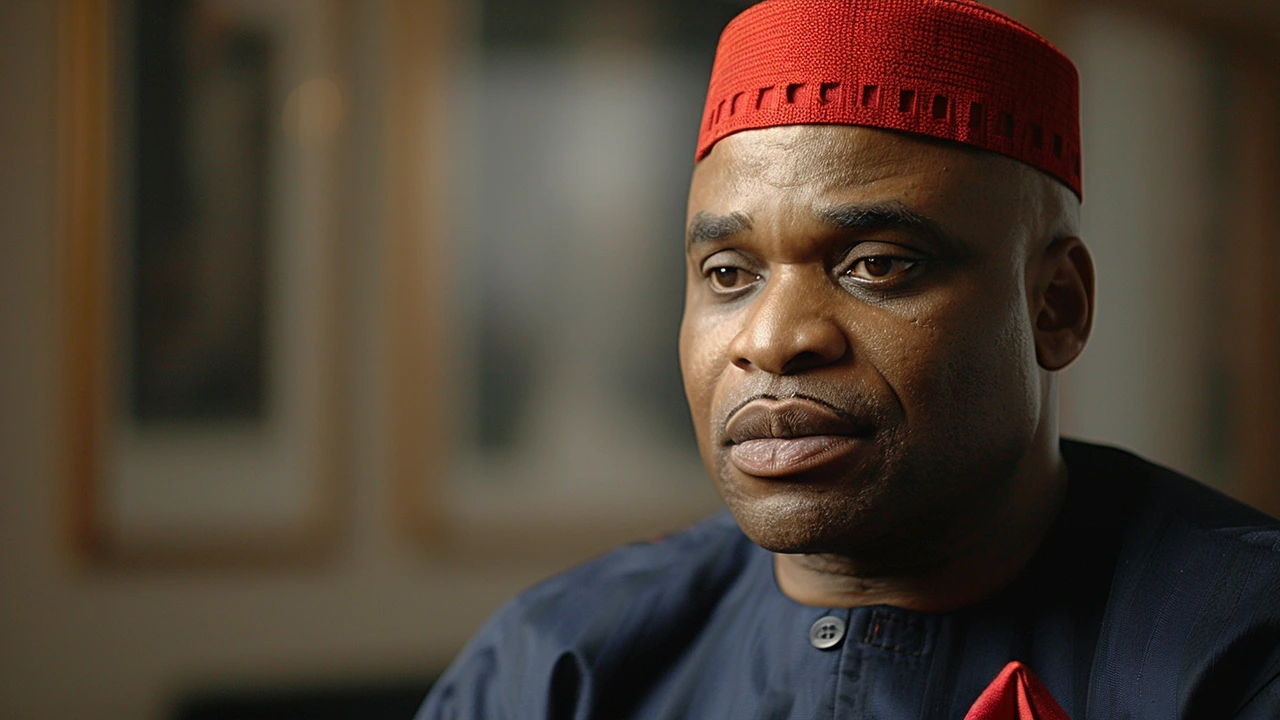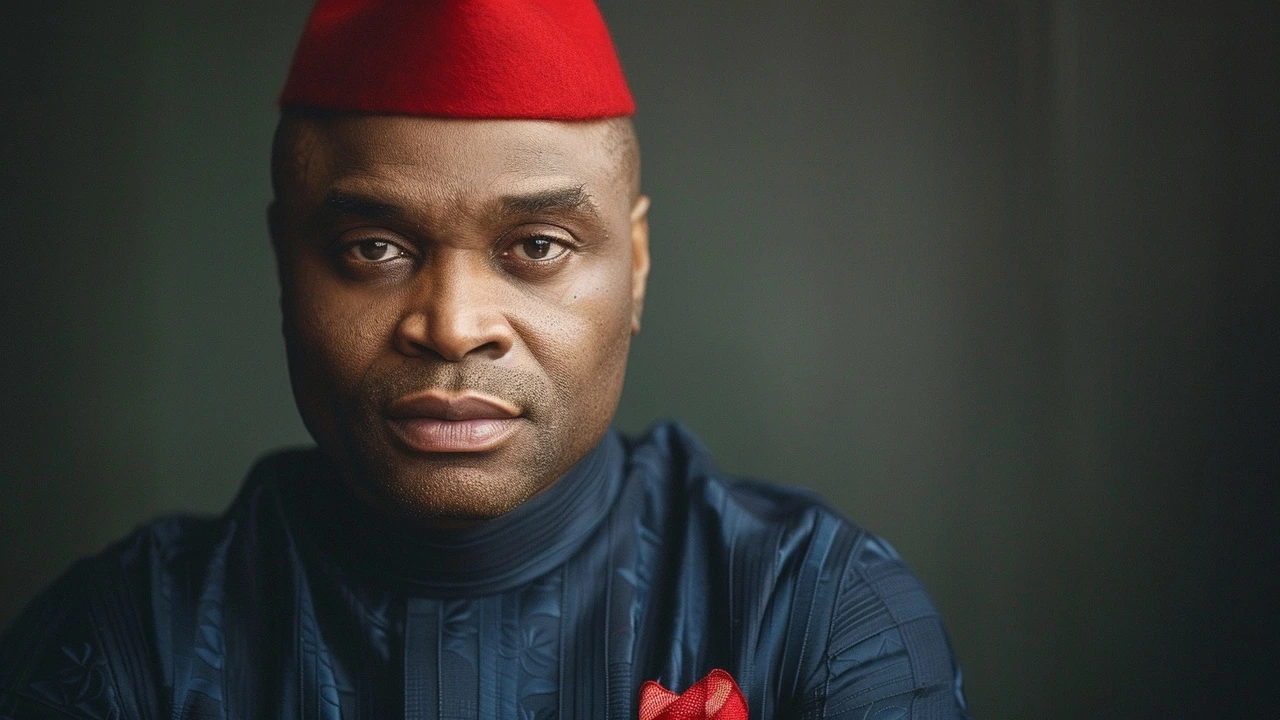A Deepening Crisis within the Labour Party
Kenneth Okonkwo, an outspoken figure within the Labour Party (LP), has recently set off a political firestorm with his scathing remarks about the party’s current leadership. In a series of allegations, Okonkwo has accused Julius Abure, the party’s chairman, and his executive team of being 'workers of iniquity' and likened them to a 'secret society led by a group of clowns.' His vivid descriptions have grabbed significant attention, both from party insiders and the broader political community.
According to Okonkwo, the Labour Party, once a beacon of hope for many Nigerian citizens, has fallen into disarray under Abure’s leadership. The controversy dates back to 2023, when Lamidi Apapa, then the deputy national chairman, declared himself the acting national chairman. This move sparked a leadership crisis that has since deepened, culminating in 2024 with Abure’s re-election as chairman during a national convention held in Anambra.
The party’s inability to address these internal conflicts has led many to question its ability to govern effectively. Okonkwo has voiced his dissatisfaction repeatedly, stating that unless the party can hold a credible national convention and restore order, he might consider leaving. His discontent underscores the concerns of many who fear that the Labour Party is losing its way.
One of the most startling aspects of Okonkwo’s accusations is his claim that the executive operates like a 'secret society.' He has called for the resignation of Abure and his cohorts, labeling them 'workers of iniquity.' Such terminology is not only strong but such allegations can have severe implications for the party’s public image.
Okonkwo's statements resonate with a faction of the Labour Party that believes the leadership is out of touch with the party’s original mission and values. This faction argues that the party has become too embroiled in internal power struggles to effectively advocate for the interests of its members and the Nigerian populace.

Accusations and Implications
The term 'workers of iniquity' carries heavy connotations that imply moral and ethical corruption. For a political party, being associated with such terms can erode public trust and support. Okonkwo's comparison of the LP executive to a secret society adds an element of clandestine operations, further damaging the party's reputation.
In Nigeria, where political corruption and secrecy are hot-button issues, such accusations wield considerable power. They not only shake the foundation within the party but also invite scrutiny from the general public and other political entities. Okonkwo’s challenge to the leadership might be seen as an attempt to galvanize support for a reformative movement within the Labour Party.
On the ground, this brewing discontent has already created ripples. Many LP members are anxiously watching how the leadership responds to Okonkwo’s allegations. Some believe this could be an opportunity for genuine reform, while others worry it might deepen the divisions within the party.
The Aftermath and Future Prospects
As the dust continues to settle, the Labour Party stands at a crossroads. The path it chooses will determine its future trajectory. If the leadership addresses the concerns raised and moves towards a transparent, credible convention, it might regain its footing. However, if it dismisses these allegations, it risks further alienation and potential splintering.
The upcoming months will be crucial for the Labour Party. The handling of this crisis and the willingness to engage with dissenting voices within the party will offer indicators of its resilience and commitment to democratic principles.
Ultimately, the Labour Party's ability to navigate this turbulent period will serve as a litmus test for its future. Will it emerge stronger and more unified, or will the internal strife lead to its gradual decline? Kenneth Okonkwo’s bold accusations have certainly set the stage for a consequential battle within one of Nigeria’s key political factions.


John Crulz
June 21, 2024 AT 18:45Reading through the latest statements, it becomes clear that the Labour Party is at a crossroads where transparency could make all the difference. The internal disputes are not just about personalities; they reflect deeper procedural gaps that need urgent attention. If the executive wants to restore confidence, a truly open national convention would be a solid first step. That said, the party also needs to listen to the grassroots voices that seem increasingly frustrated with the current direction. A balanced approach, blending firm leadership with genuine dialogue, might just steer the party back onto its founding ideals.
Anita Drake
July 4, 2024 AT 18:22It’s heartbreaking to see a movement that once inspired so many now tangled in internal squabbles. We should remember that the core mission of any party is to serve the people, not to become an echo chamber for a select few. Let’s encourage the leadership to open the floor, welcome diverse perspectives, and prioritize the hopes of ordinary Nigerians. After all, inclusive dialogue is the bedrock of lasting change.
Eduardo Lopez
July 17, 2024 AT 15:13The description of the executive as a “secret society led by clowns” isn’t just colourful-it’s painfully accurate. What we’re witnessing is a theatrical display of power‑hoarding, where the real issues are buried under layers of intrigue and self‑congratulation. It feels as if the party’s leadership has taken a page from a bad sitcom, performing for an audience that has clearly lost interest. Such behavior betrays the trust of members who expected real reform, not more smoke‑and‑mirrors.
Nancy Perez de Lezama
July 30, 2024 AT 12:04The leadership seems more interested in drama than governance.
Matt Heitz
August 12, 2024 AT 08:54From a nationalist standpoint, the ongoing infighting jeopardizes our country’s stability. When a major party turns inward, the whole democratic fabric suffers, and voters are left disillusioned. The jargon of “secret societies” masks a very real threat: the erosion of public trust in institutions. If the executive continues to prioritize self‑preservation over national interest, we’ll see a widening gap between the people and their representatives.
Susan Mark
August 25, 2024 AT 05:45Procedurally, a credible national convention should follow the party’s constitution, ensuring transparent delegate selection and clear voting mechanisms. Historically, parties that stick to their internal rules tend to maintain member confidence even during tough periods. It would help if the current leadership set up an independent monitoring committee to oversee the process. Such steps could rebuild trust and show that the party is still committed to democratic principles.
Jason Jennings
September 7, 2024 AT 02:36Just another power grab.
Diego Vargas
September 19, 2024 AT 23:26It looks like the same old story repeatd, and many folks wont be surprised. The pattern of elite cliques takin over decision makng has been around for decades. If you ask me, this just proves that the party needs a fresh start, not more of the same old. People are tired of hearing the same promises while nothing reallly changes.
Alex Lee
October 2, 2024 AT 20:17This is just more political theater.
Vida Yamini
October 15, 2024 AT 17:08First of all, I want to acknowledge how painful this whole situation must be for every member who believed in the Labour Party’s original vision. It’s clear that the current leadership’s actions have created a sense of betrayal, and that feeling is completely understandable. The good news is that even in moments of deep crisis, there is always room for renewal and growth. If we collectively focus on constructive dialogue, we can transform this turmoil into an opportunity for meaningful reform. It’s essential that every voice, especially those of rank‑and‑file members, is heard and respected. By establishing open forums and transparent decision‑making processes, the party can begin to rebuild the trust that has been eroded. Moreover, mentorship programs could empower younger activists, ensuring fresh perspectives are nurtured. The emphasis on inclusive policy formulation will also help the party align more closely with the aspirations of ordinary Nigerians. Let’s also encourage the leadership to publicly acknowledge past missteps; such accountability can be a powerful catalyst for change. In addition, adopting clear timelines for internal elections can prevent future power vacuums. The party should consider inviting independent observers to monitor upcoming conventions, guaranteeing fairness. It’s also worth reminding everyone that the Labour Party’s roots lie in social justice and democracy-principles that should never be abandoned. By revisiting these foundational values, members can rediscover their shared purpose. Finally, I believe that with patience, solidarity, and a commitment to transparency, the Labour Party can emerge stronger, more united, and better equipped to serve the Nigerian people.
James Lawyer
October 28, 2024 AT 12:58From a procedural perspective, the allegations raised necessitate a thorough internal audit in accordance with the party’s bylaws. It would be prudent for the executive committee to convene an impartial panel to assess the validity of the claims. Ensuring due process not only upholds the organization’s integrity but also safeguards the rights of all members involved. Ultimately, a transparent resolution will reinforce confidence in the party’s governance structures.